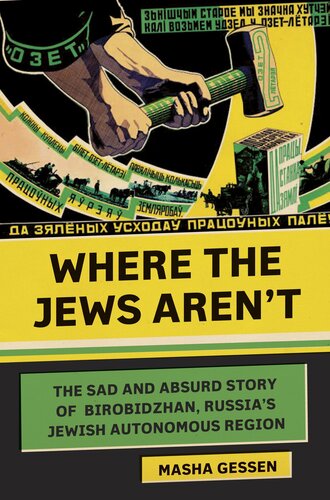
Where the Jews Aren't
The Sad and Absurd Story of Birobidzhan, Russia's Jewish Autonomous Region
کتاب های مرتبط
- اطلاعات
- نقد و بررسی
- دیدگاه کاربران
نقد و بررسی

June 13, 2016
In this slim and accessible book, Russian-American journalist Gessen (The Brothers) traces the grim story of Birobidzhan, a region in the desolate Soviet Far East where Jews were granted autonomy and an opportunity to escape their harsh existence of poverty, discrimination, terror, and “non-belonging” in Soviet Russia. The hopes were never realized, however, and the venture turned out to be a tale of “concentrated tragic absurdity.” It was ill-fated from the start and problems arose at every turn, including the location, planning, and logistics as well as the terror of Stalin’s purges. Gessen also frames the work as a broader cultural history of the Jewish experience in the U.S.S.R., and of “the concept of home, and knowing when to leave.” A major figure here is David Bergelson (1884–1952), the wandering Yiddish-language writer whose “outstanding survival instincts” led him to flee the U.S.S.R. and then Nazi Germany before returning to Soviet Russia, where he “placed himself in the service of Birobidzhan” in a vain attempt to revive hopes for Jewish autonomy. He was eventually executed after a nonsensical trial that further demonstrated the “cruel absurdity” of this story. Gessen ably tells one of the 20th century’s most chilling stories of struggle, perseverance, and despair.

June 15, 2016
Moscow-born Gessen (The Brothers: The Road to an American Tragedy, 2015, etc.) addresses the story of the Jewish struggle for autonomy in Stalin's Russia.With no reason given, the Russian government decided that Jews, along with other ethnic groups like the Koreans, should be granted their freedom in an out-of-the-way spot along the Chinese border. Birobidzhan was one of the world's two Jewish states, a place with a Yiddish language newspaper but no Yiddish-speaking residents. As the author tells of the formation of the settlement in 1934, she describes life as a Russian Jew. Even though she left when she was 12, Gessen ably explores the mindset of those before her who lived through the time. Simon Dubnow, the historian of Eastern European Jewry, and poet and author David Bergelson contribute to the cultural picture. A Jew's legacy is a "long string of migrations." Home was always elsewhere, and being Jewish meant being ostracized, beaten, and forbidden entrance to university. Bergelson's survival instincts were legion. He knew when to run without looking back, fleeing Russia and then Nazi Germany. He understood the concept of home and knowing when to leave. After working with Stalin, he bided his time and then worked against him. The history of Birobidzhan, writes Gessen, is absurd. In the interwar years and again after World War II, families, orphans, and other displaced persons were sent to an area that grew nothing to live in quarters without running water and that leaked in the frigid winters. In short, it was a place with little hope of continued success. However, it still felt the wrath of Stalin's purges, particularly the great terror of 1936 and his postwar paranoid cleansing of rootless cosmopolitanism. Though the narrative offers a depressing picture of Russian Jews, it is packed with wonderful stories of strength, intelligence, and impressive perseverance.
COPYRIGHT(2016) Kirkus Reviews, ALL RIGHTS RESERVED.

June 15, 2016
The Bolshevik ideal of autonomous ethnic enclaves within Russia gave rise to Birobidzhan, a Yiddish-speaking territory set aside for Jews near the border with China. Its "sad and absurd" history mirrors that of Jews in the former Soviet Union, and for Gessen (The Brothers), her own journey as a Jew and a gay woman from the Soviet Union to the United States to Russia and back to the United States again. While the region started with idealism despite challenging circumstances and was further strengthened by refugees during and after World War II, Joseph Stalin's purges robbed Birobidzhan of its champions and the culture that made it appealing. The book focuses on those heroes, notably David Bergelson and Simon Dubnow. Both men lived intellectual lives steeped in visions for a future. Their deaths reflected the reality for so many in Europe: Dubnow at the hands of the Nazis and Bergelson by Stalinist firing squad. The bizarre nature of life in Birobidzhan gives dark humor to Gessen's narrative. VERDICT This brief though complex book provides an illuminating chronicle of an underexamined area of 20th-century Jewish history.--Margaret Heller, Loyola Univ. Chicago Libs.
Copyright 2016 Library Journal, LLC Used with permission.

























دیدگاه کاربران